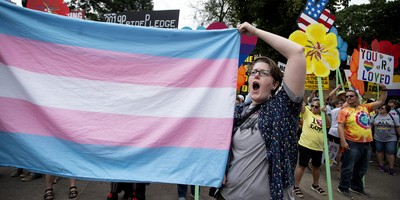The French government this week decided to fine Muslim women who wear a full-face veil in public -- and France is only the latest in a series of European countries seeking to ban the religious garb. Is this an infringement of religious liberty intended to discriminate against Muslims? Or is the measure necessary to protect the security of others? The answers are a lot more complicated than you might think.
A minority of Muslim women actually wear the burqa or niqab in Muslim countries or the West. The garb consists of a gown and headdress that covers the woman head to foot, revealing only her eyes. Obviously, it is impossible to determine who is under the veil -- even whether the person is male or female. In Paris recently, a group of armed robbers pulled a heist wearing burqas, which made it not only impossible to identify them but easy for the criminals to conceal their weapons when entering the bank.
And the burqa presents even greater challenges when it comes to national security. Increasingly, we rely on cameras and facial recognition software to aid in protecting us against terrorism in public places. What's more, one of the most effective means for airport screeners to detect a potential terrorist is to assess the person's facial reactions: Does he or she appear unduly furtive or nervous, for example. But these techniques are impossible if the person is wearing a burqa.
As Jean-Francois Cope, majority leader in the French National Assembly, wrote in a recent New York Times op-ed, "(The burqa) is not an article of clothing -- it is a mask, a mask worn at all times, making identification or participation in economic and social life virtually impossible." And that is also its intent: to isolate the wearer from all aspects of public life.
Recommended
As Cope notes in his op-ed, the Koran does not tell women they must cover their face, and most Muslim women do not do so. The burqa goes far beyond protecting a woman's modesty; it transforms a woman into a non-person. She becomes a shrouded creature whose face and body are undistinguishable as a unique human being.
Two decades ago, it was exceedingly rare to see burqas in public in the United States. But, depending on where you live, burqas are now visible at shopping malls and on the street. What strikes me most when I encounter burqa-clad women is the contrast between their dress and their male companions'. Most of these women are covered in thick, black cloth, even in Washington's 90-plus degree summers, while the men wear short sleeves and light khakis.
Here's a challenge to Muslim men who believe that the wearing of the burqa is no hardship on women. Don one yourself and wear it for a week. Wear it to work and see if it impedes your ability to do your job. Wear it when you go out in public and see what it's like to try to interact with others. Wear it when you go to the local mall or the park or take your children for a walk. And, by all means, do so on the hottest day of the year.
The First Amendment would likely make a broad ban on the burqa in the United States unconstitutional, though some states have restricted its wearing for such activities as obtaining a driver's license. But it would be a false tolerance to suggest that we should treat the burqa as a symbol of religious freedom. The burqa is a statement about the woman's status more than a religious one. The burqa-clad woman is not an individual with rights; she belongs to a man -- her husband, father or brothers -- whose "property" must be protected from other men's gaze. We may not ban the burqa here, but we can and should disapprove of it.

























Join the conversation as a VIP Member